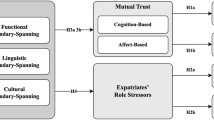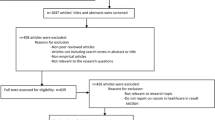Abstract
Despite numerous suggestions to integrate culture, diversity and social justice issues in clinical supervision, empirical studies on cross-cultural supervision indicate limited uptake of such recommendations. We suggest that a comprehensive model of cross-cultural supervision could benefit the field by guiding supervisors in this task. A working model is proposed based on a foundation of the supervisory alliance and a focus on social work practice competence, integrating strategies to promote self- and relational-reflexivity within the supervisory relationship. The model is comprised of four components: component 1: goal setting to contract on cross-cultural integration in supervision; component 2: active listening for cross-cultural markers; component 3: bonding through the supervisor’s self-reflexivity to foster the supervisee’s self-reflexivity; and component 4: working through tasks for cultural integration in supervision by modelling the supervisor’s relational reflexivity in case formulation and treatment to foster the supervisee’s relational-reflexivity.


Similar content being viewed by others
References
Almeida, R., Woods, R., Messineo, T., & Font, R. (1998). The cultural context model: An overview. In M. McGoldrick (Ed.), Revisioning family therapy: Race, culture, and gender in clinical practice (pp. 414–431). New York: Guildford.
Asakura, K., & Maurer, K. (2018). Attending to social justice in clinical social work: Supervision as a pedagogical space. Clinical Social Work Journal. https://doi.org/10.1007/s10615-018-0667-4.
Berger, R., Quiros, L., & Benavidez-Hatzis, J. R. (2017). The intersection of identities in supervision for trauma-informed practice: Challenges and strategies. The Clinical Supervisor, 37(1), 122–141. https://doi.org/10.1080/07325223.2017.1376299.
Bogo, M., Katz, E., Regehr, C., Logie, C., Mylopoulos, M., & Tufford, L. (2013). Toward understanding meta-competence: An analysis of students’ reflection on their simulated interviews. Social Work Education, 32(2), 259–273.
Bogo, M., & McKnight, K. (2005). Clinical supervision in social work: A review of the research literature. In L. Shulman & A. Safyer (Eds.), Supervision in counseling: Interdisciplinary issues and research. New York, NY: The Haworth Press. (also published in The Clinical Supervisor, 24(1/2), 49–67).
Bordin, E. (1979). The generalizability of the psychoanalytic concept of the working alliance. Psychotherapy: Theory, Research and Practice, 16, 252–260.
Bordin, E. S. (1983). A working alliance based model of supervision. The Counseling Psychologist, 11, 35–42. https://doi.org/10.1177/0011000083111007.
Burkard, A. W., Johnson, A. J., Madson, M. B., Pruitt, N. T., Contreras-Tadych, D. A., Kozlowski, J. M., Hess, S. A., & Knox, S. (2006). Supervisor cultural responsiveness and unresponsiveness in cross-cultural supervision. Journal of Counseling Psychology, 53, 288–301.
Burkard, A. W., Knox, S., Clarke, R. D., Phelps, D. L., & Inman, A. G. (2014). Supervisors’ experiences of providing difficult feedback in cross-ethnic/racial supervision. The Counseling Psychologist, 42(3), 314–344.
Burnham, J. (2006). Relational reflexivity: A tool for socially constructing therapeutic relationships. In C. Flaskas, B. Mason & A. Perlerz (Eds.), The space between. London: Karnac Books.
Burnham, J. (2012). Developments in Social GRRRAAACCEEESSS: Visible–invisible and voiced–unvoiced. In I.-B. Krause (Ed.), Culture and reflexivity in systemic psychotherapy: Mutual perspectives (pp. 139–160). London: Karnac Books.
Burnham, J., Palma, A., D., & Whitehouse, L. (2008). Learning as a context for differences and differences as a context for learning. Journal of Family Therapy, 30, 529–542.
Chang, C. Y., Hays, D. G., & Milliken, T. (2009). Addressing social justice issues in supervision. A call for client and professional advocacy. The Clinical Supervisor, 28, 20–35.
ChenFeng, J., Castronova, M., & Zimmerman, T. (2017). Safety and social justice in the supervisory relationship. In R. Allan & S. Singh Poulsen (Eds.), Creating cultural safety in couple and family therapy: Supervision and training. New York: Springer.
Divac, A., & Heaphy, G. (2005). Space for GRRAACCES: Training for cultural competence in supervision. Journal of Family Therapy, 27, 280–284.
Falender, C. A., & Shafranske, E. P. (2012). Getting the most out of clinical training and supervision: A guide for practicum students and interns. Washington, DC: American Psychological Association.
Fonagy, P., Gergely, G., Jurist, E., & Target, M. (2004). Affect regulation, mentalization, and the development of self. New York: Other Press.
Goodyear, R. K. (2014). Supervision as pedagogy: Attending to its essential instructional and learning processes. The Clinical Supervisor, 33, 82–99.
Greenberg, L. S., & Foerster, F. S. (1996). Task analysis exemplified: The process of resolving unfinished business. Journal of Consulting and Clinical Psychology, 64, 439–446.
Hair, H. J. (2014). Supervision conversations about social justice and social work practice. Journal of Social Work, 15(4), 349–370.
Hair, H. J., & O’Donoghue, K. (2009). Culturally relevant, socially just social work supervision: Becoming visible through a social constructionist lens. Journal of Ethnic and Cultural Diversity in Social Work, 18, 70–88.
Hardy, K. V., & Laszloffy, T. A. (1995). The cultural genogram: Key to training culturally competent family therapists. Journal of Marital and Family Therapy, 21, 227–237.
Hernández, P. (2003). The cultural context model in supervision: An illustration. Journal of Feminist Family Therapy, 15(4), 1–18.
hooks, b. (1994). Teaching to transgress: Education as the practice of freedom. London: Routledge.
Horvath, A. O. (2007). The alliance in context: Accomplishments, challenges, and future directions. Psychotherapy: Theory, Research, Practice, Training, 43(3), 258–263.
International Federation of Social Workers (2014). The global definition of social work. Retrieved July 17, 2018 from https://www.ifsw.org/what-is-social-work/global-definition-of-social-work/.
Kadushin, A., & Harkness, D. (2014). Supervision in social work (5th ed.). New York: Columbia University Press.
Lawless, J. J., Gale, J. E., & Bacigalupe, G. (2001). The discourse of race and culture in family therapy supervision: A conversation analysis. Contemporary Family Therapy, 23(2), 181–197.
Lawlor, D. (2013). A transformation programme for children’s social care managers using an interactional and reflective supervision model to develop supervision skills. Journal of Social Work Practice, 27(2), 177–189.
Lee, E. (2010). Revisioning cultural competencies in clinical social work practice. Families in Society, 91(3), 272–279.
Lee, E., & Horvath, A. O. (2013). Early cultural dialogues in cross-cultural clinical practice. Smith College Studies in Social Work, 83(2–3), 185–212.
Lee, E., & Horvath, A. O. (2014). How a therapist responds cultural versus noncultrual dialogues in cross-cultural clinical practice. Journal of Social Work Practice, 28(2), 193–217.
Lehrman-Waterman, D., & Ladany, N. (2001). Development and validation of the evaluation process within supervision inventory. Journal of Counseling Psychology, 48, 168–177.
Munson, C. E. (2002). Handbook of clinical social work supervision (3rd ed.). New York: The Haworth Press, Inc.
Neden, J., & Burnham, J. (2007). Using relational reflexivity as a resource in teaching family therapy. Journal of Family Therapy, 29, 359–363.
Nelson, M. L., Barnes, K. L., Evans, A. L., & Triggiano, P. J. (2008). Working with conflict in clinical supervision: Wise supervisors’ perspectives. Journal of Counseling Psychology, 55, 172–184.
O’Donoghue, K., Wong Yuh Ju, P., & Tsui, M. (2018). Constructing an evidence-informed social work supervision model. European Journal of Social Work, 21(3), 348–358. https://doi.org/10.1080/13691457.2017.1341387.
Pendry, N. (2012). Race, racism, and systemic supervision. Journal of Family Therapy, 34, 403–418.
Rice, L. N., & Greenberg, L. S. (1984). Patterns of change: Intensive analysis of psychotherapy process. New York: Guilford Press.
Roper-Hall, A. (1998). Working systemically with older people and their families who have ‘come to grief’. In P. Sutcliffe, G. Tufnell & U. Cornish (Eds.), Working with the dying and bereaved: Systemic approaches to therapeutic work (pp. 177–206). London: Macmillan.
Rousmaniere, T. G., & Ellis, M. V. (2013). Developing the construct and measure of collaborative supervision: The supervisee’s perspective. Training and Education in Professional Psychology, 7(4), 300–308.
Safran, J. D., Muran, J. C., & Samstag, L. W. (1994). Resolving therapeutic alliance rupture: A task analytic investigation. In A. O. Horvath & L. S. Greenberg (Eds.), The working alliance: Theory, research, and practice (pp. 225–255). New York: Wiley.
Shulman, L. (2010). Interactional supervision (3rd ed.). Washington DC: NASW Press.
Sutter, E., McPherson, R., & Geeseman, R. (2002). Contracting for supervision. Professional Psychology: Research and Practice, 33, 495–498.
Totsuka, Y. (2014). ‘Which aspects of social GGRRAAACCEEESSS grab you most?’ The social GGRRAAACCEEESSS exercise for a supervision group to promote therapists’ self-reflexivity. Journal of Family Therapy, 36, 86–106.
Tsang, A. K. T., & Bogo, M. (1997). Engaging with clients cross culturally: Using research and developing research for effective practice. Journal of Multicultural Social Work, 6(3/4), 73–91.
Tufekcioglu, S., & Muran, J. C. (2015). Case formulation and the therapeutic relationship: The role of therapist self-reflection and self-revelation. Journal of Clinical Psychology in Session, 71(5), 469–477.
Watkins, C. E., & Hook, J. N. (2016). On a culturally humble psychoanalytic supervision perspective: Creating the cultural third. Psychoanalytic Psychology, 33(3), 487–517.
Young, R. (2004). Cross-cultural supervision. Clinical Social Work Journal, 32(1), 39–49.
Author information
Authors and Affiliations
Corresponding author
Rights and permissions
About this article
Cite this article
Lee, E., Kealy, D. Developing a Working Model of Cross-Cultural Supervision: A Competence- and Alliance-Based Framework. Clin Soc Work J 46, 310–320 (2018). https://doi.org/10.1007/s10615-018-0683-4
Published:
Issue Date:
DOI: https://doi.org/10.1007/s10615-018-0683-4




